Incredible Celtic History of Chess

Celtic Chess
Most people are comfortable with the concept of chess originally coming from one or the other of these. But what about this idea that chess originated in Ireland? Is that not just a little bit beyond the Pale? Well in the interests of completeness why don't we investigate?
In much the same way that figures from Medieval Europe enter into combat in Battle Chess, the pieces were built in the image of Celtic Chieftains and Celtic nobles.
The game was played on an 8x8 64 square game board with 8 pieces and 8 pawns, just like modern chess.
Chess in Irish Myth and Legend
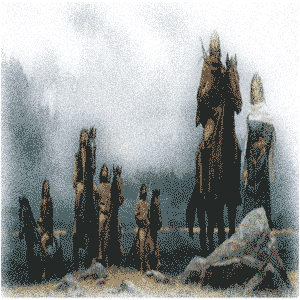
Celtic History of Chess - A Chieftain, his Queen and nobles
One such reference concerning an Irish chess variant called Fidchell comes from Mac da Cherda and Cummaine Fota:
"Good," says Guaire, "Let's play fidchell."
"How are the men slain?" says Cummaine.
"Not hard, a black pair of mine about one white man of yours on the same line, disputing the approach on the far side."
"My conscience, indeed!" said Cummaine, "I cannot do the other thing, but I shall not slay (your men), you will not slay my men."
For a whole day Guaire was pursuing him and he could not slay one of his men.
"That is champion-like, o cleric," said Guaire.
Historical References
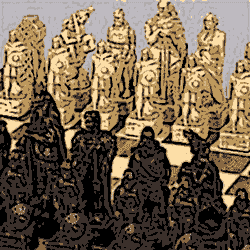
Celtic History of Chess - The Pieces
This he the king said then, that the chessboards of Tara should be fetched to him Samildánach and he won all the stakes, so that then he made the Cró of Lugh.
In 1768 we see the following reflections:
Brannumh, chess, a game played upon a square board divided into sixty-four small chequers: on each side there are eight men and as many pawns, to be moved and shifted according to certain rules; an fitcheall agus an brannamh ban, (Old Parchment,) probably means the men; gon a bhranaibh déad, with his ivory men, because made of elephant's teeth. This was a favourite game with the old Irish.
Lewis Chess Set
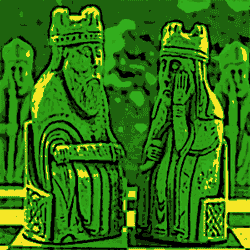
Celtic History of Chess - Isle of Lewis King and Queen
One of those pieces was a king that looked identical to the ones used in the Isle of Lewis set. This suggests that the Isle of Lewis chess set had Celtic ties, possibly dating back a couple of thousand years.
Many of the expressions on the faces of the pieces are also said to have remarkable similarities to the facial expressions of people in pictures in the Book of Kells.
Conclusions
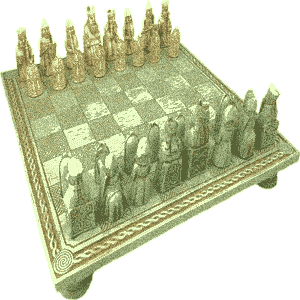
Celtic History of Chess - Isle of Lewis Chess Set
Did those ancient tribes in Ireland and possibly Scotland play by rules broadly similar to the rules of chess today? Who knows? And if they did, what direction did the game travel? From Ireland to Asia or from Asia to Ireland?
Either way I doubt that the Indians or Chinese will be losing sleep. Their historians and scholars will continue to squabble over which Asian superpower is the original homeland of chess.
Moving On
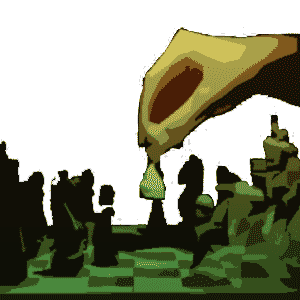
The game spread from India through the Middle East into North Africa and finally Europe
Remember no one really knows definitively who first came up with chess. It's plausible that different civilizations in different parts of the world came up with similar concepts for war-like board games independently of each other. Kind of like the way the Egyptians and the indigenous tribes of the Americas both came up with pyramids.
It seems a fitting way to conclude the LAPOC study of chess history, to lob in a grenade like that, then run for the hills. You can always get a quick primer any time.






